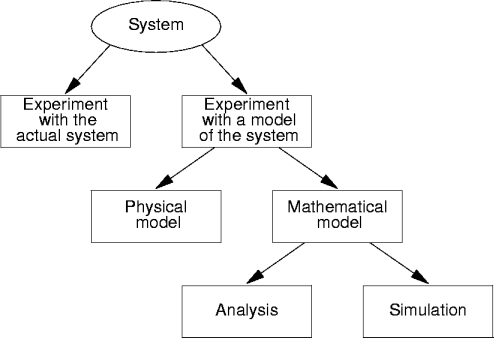Systems
- A system is a collection of entities exchanging events in reaction
to stimuli.
- Reasons for analyzing systems:
- Altering behavior to make the system operate with less noise or fewer
resources (optimization).
- Forecasting behavior to speculate how changes may affect the system.
- Analyzing behavior to determine which and how system part
combine to produce a paritcular result.
- Comparing behavior among several similar systems.
System Analysis
- There are various analysis techniques that can be applied to systems.

Simulation Types
- Static vs. dynamic.
- Static: the model is unchanging.
- Dynamic: the model changes over time.
- Deterministic vs. stochastic.
- Deterministic: output is (eventually) predictable given the inputs.
- Stochastic: output is never exactly predictable.
- Continuous vs. discrete (global vs. local).
- Discrete: changes occurs over a limited number of intervals.
- Continuous: Change occurs over arbitrary intervals.
Simulation Types
- The model type influences the simulation type.
- Fluid flow; continuous simulations.
- Many independent interacting particles; differential models.
- Instutional money flow; Hybrid discrete-continous simulations.
- Discrete agents with continuous cumulative attributes.
- The area of a circle; Monte Carlo simulations.
- Analytically intractable, static models.
Discrete-Event Models
- A discrete-event model
- evolves over time (is dynamic) and
- changes instaniously at identifiable times (is discrete).
- It may be stochastic or deterministic.
- The system being modeled need not have these properties.
Example Discrete-Event Model
- How long does someone wait in line at a single-ATM booth?
- Model entities: the ATM, the queue, customers.
- Model events: Customers join or leave the queue, a customer starts and
finishes using the ATM.
- If customers don't get disgusted and leave before service, The
customer starts ATM and customer leaves queue are the same.
- Model parameters: customer arrival rate, customer service rate.
- Simple versions of this model have closed-form (analytic) solutions via
queuing theory.
- However, the model easily becomes non-simple.
Discrete-Event Simulation
Single Server Queue Example
Simulation Advantages
- Often the most partical way of dealing with complex, dynamic,
stochastic systems.
- Changing the simulation can be easy, allowing for what-if
experimentation.
- Normally uncontrollable factors, such as time and environment, are
controlled in a simulation.
Simulation Disadvantages
- Simulations can never provide answers, they can only suggest them.
- But a good simulation make strong suggestions.
- Developing or using simulations may be expensive.
- The validity and verasity of simulations and are always under question.
- Time is the only cure for this (but systems evolve).
This page last modified on 25 February 2005.

